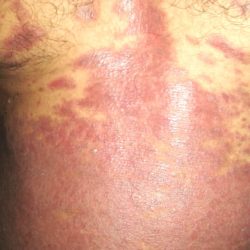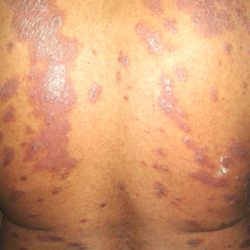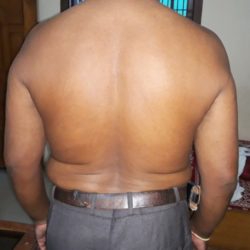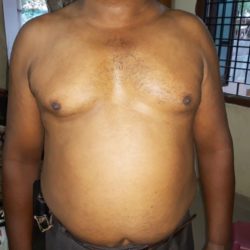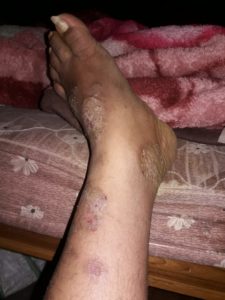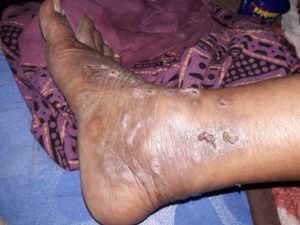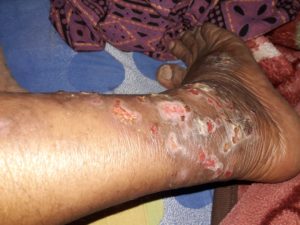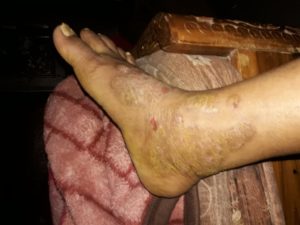Ayurveda’s Internal and External Cleansing Process to treat Psoriasis
A middle aged man once approached me with a severe case of Psoriasis. He was fairly overweight, but that was not the worrying part. His entire upper body was red and scaly, like as though he had been burned. He complained of terrible itchiness, and had been suffering for over a year.
When this patient first walked into my clinic, I identified his dosha as the pitha dosha. A big time foodie, he had the habit of eating out very often. His obesity, accompanied by the stress of not being able to recover from the disease led to the worsening of his condition. Despite consulting various doctors and trying different forms of medicine, he was not healing. His condition started taking a serious toll on his overall health and personal relationships as well. He was depressed, and it reached a point where suicidal thoughts had crept into his mind.
To treat him, I started off by prescribing regular ‘takradhara’, which is a full body bathing process with medicated buttermilk. Along with this, he began taking anti-psoriasis ayurvedic medicines as well.
Slowly but surely, his condition began to improve. The red patches were subsiding, and the process began giving him relief from the itchiness. Within a period of three months, he was completely free from the psoriasis.
It is currently five years since he recovered. I have been following up with him occasionally ever since. His psoriasis has never resurfaced and he is living a happy, healthy life.
In another incident, a patient approached me with a year long history of foot lesions. His condition was also severe, with itchy, painful spots all over his feet.
Having approached many dermatologists and taken allopathic medicines over the past year, he did not see any improvement in his condition. As a last resort, he decided to try Ayurveda.
Since his case was difficult to diagnose, I made sure to double check by consulting a friend of mine who is a skin specialist. He confirmed that this is a condition that is medically known as “psoriasis vulgaris”. I decided to treat the situation with anti psoriasis medication accompanied with blood purifiers.
Where allopathic medicines did not bring any positive results, Ayurveda ended up healing the patient. Over the course of the next three months, his condition improved drastically. His itchiness completely vanished, and his skin grew strong once again.
The patient was very happy with our treatment. He gained so much faith in Ayurveda that his entire family has started to consult me as their family doctor.
Psoriasis is a disease that causes red, scaly patches on the surface of the skin. There are five different types of this disease, and symptoms vary accordingly. It typically affects the outside of the elbows, knees or scalp; although it can appear on any location. It is an itchy disease that can burn as well as sting at times. It is NOT communicable, which means it does not get transferred from person to person through any form of touch.
Psoriasis can be mild, moderate or severe. The quicker the detection and treatment, the quicker the cure for this condition.
It can be caused by a wide, diverse range of factors. While some forms of psoriasis can be hereditary, the disease can also be caused due to stress, injury to skin, infections and adverse reaction to medication.
Ayurvedic treatment for the same is a slow and steady process that takes anywhere between one to three months (depending on the severity). However, it is a process that brings about more than just healing. It places importance on living a healthy lifestyle, and helps the patient come out of the disease as a stronger person overall. Ayurvedic treatment includes not only internal or external use of medicines, but also cleansing through relevant panchakarma process.
Some final thoughts (to be updated as thought bubbles):
- Approach a genuine doctor who is experienced in Ayurveda and holds an authentic Bachelor of Ayurvedic medicine degree. This advice is because some patients are consulting quacks who study Ayurveda for as little as six months, and then prescribe wrong treatment. The patients finally end up blaming the Ayurvedic system for a mistake of the “doctors”.
- Any disease responds to Ayurvedic treatment quickly. The main thing to remember is not to allow it to become chronic before you approach an Ayurvedic doctor
- Adhere to the lifestyle and food related changes advised by the traditional medicine expert and you will see that the healing is quicker and long-lasting.

